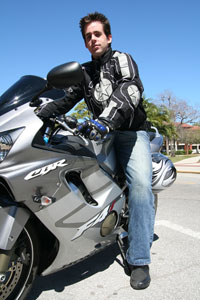Flagler student does not let being deaf hold him back from anything

By Andrea Huls
Being deaf is part of who Andy Sherwood is. However, deafness does not define him. His dreams, projects and goals do.
“The media doesn’t include deaf culture,” he said. “Only people who are in contact with deaf people are aware.”
Sherwood is a communication major focusing on public relations. He also loves filmmaking and plans to use his personal experience and knowledge to make films and documentaries about the deaf culture.
His perspective of the world is different from that of a hearing person, which has granted him skills in photography and great visual creativity that will help him produce unique documentaries.
According to Sherwood, there are many misconceptions about deaf culture. For example, many people believe that sign language is international, and this is not true. Sherwood, who is from England, spoke British Sign Language and had to learn American Sign Language to be able to communicate. Sherwood had a difficult time adapting because there was more than one language barrier. According to Sherwood, students isolated him or didn’t try to approach him because of his deafness.
“My deafness is not by choice,” he said. “Hearing people think deaf are all the same. This is not true. Most people think that deaf people can’t drive, can’t travel or that they can’t be independent and that is not true either.”
In his native England, Sherwood, 23, went to community college to study Information Communication Technology for two years. After that he went to film school for a year. Initially Sherwood wanted to go to Gallaudet University in Washington D.C., the world’s only university for deaf and hard of hearing which makes it unique to deaf communities worldwide. But a degree from there is not recognized in England.
He decided to go to Flagler, which is one of Gallaudet’s region centers for deaf education, and get a degree that would be accepted in the UK.
“I chose Flagler because it was in Florida and I thought that if Flagler was part of the Gallaudet program then it should be good enough for me,” said Sherwood.
Both of Sherwood’s parents are deaf, so when he was born, learning sign language was very natural for him. However, according to Margaret Finnegan, deaf and hard of hearing coordinator here at Flagler, 96 percent of the children who are born deaf have hearing parents.
“When those children are born, most parents don’t even know what deafness really means,” Finnegan said. In the majority of cases, parents do not know their children are deaf until 15 months later.
“With parents who do not know anything about deafness it’s time wasted,” she said.
Finnegan says that parents go through a period of grief because their child is not “normal,” and it is hard for the parents to communicate with them and understand their needs. It is a long process before some parents decide to accept sign language if they ever accept it. She says that many parents think that the only way children can function in society is through speech.
“Deafness is not a disability but rather a different way of being,” Finnegan said. “Most people have a great respect for spoken language, and there should be one for sign language as well.”
Carol Erting, director of culture and communication studies at Gallaudet University, says in a documentary, “Our school system has not really accepted the fact that deaf children are deaf, and have tried through out the years to make deaf children as much as like hearing children as possible.”
The documentary is called “For a Deaf Son,” and it was done by a father who wanted to understand and communicate with his son.
“We [society] are not empathetic to people who are different from ourselves,” Finnegan said. Some people see the disability and not the person. “We think that we need to take care of people, but people with disabilities are very self-sufficient,” she said.
Sherwood has shown that. He belongs to a motorcycle club in Jacksonville, where he goes once a month to hang out and ride his bike. He has also traveled throughout Europe, including Ireland, France, Denmark, Germany, Holland, Belgium, Poland, Czech Republic and many other countries.
There are people, however, who have great respect for the deaf culture. Freshman deaf education major Micah Colombo feels very comfortable using sign language. “The moment I started to sign, I fell in love with it,” Colombo said. “With words you can express life, but with signs and facial expressions, you can express the world.”
According to Colombo, deaf people appreciate more the simple pleasures in life.
“The deaf people I have come across don’t let their inability to hear get in their way,” she said. “They jump, they holler, they ask personal questions and get to know you. There is always a sense of family and love … that is what I like the most.”
But that can’t be said of everyone. According to Finnegan, the local movie theater has an open-caption movie once a week. Yet, it is usually in the afternoon and a movie that is not popular or very few people care to see. When she asked why there weren’t more open captioned movies and more days a week, she was told that it bothers the hearing to see the captions on the screen because it is distracting.
She says deaf people do not need pity, they need people who can advocate and promote their culture.
Kathleen Soehngen, president of the Deaf Awareness Club at Flagler, says that you don’t need to sign to communicate with deaf people. The club has silent dinners where no one is allowed to talk and they communicate through different gestures.
“I think it is important to get more people involved to bring awareness to the community,” she said.
Sherwood, who will graduate next year, said nothing will stop him from reaching his goals and giving a voice to the deaf community.
“I don’t like people to have sympathy for me. I prefer people see me as a person,” Sherwood said. “Yes, I am deaf, but that is not all that I am.”



Be the first to comment on "Sherwood’s life in the fast lane"